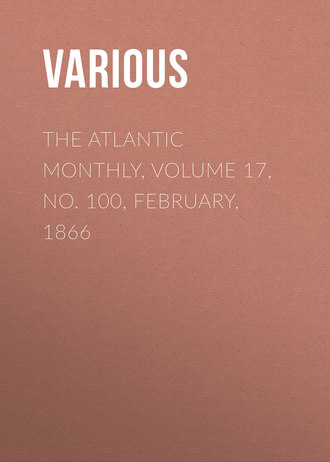 полная версия
полная версияThe Atlantic Monthly, Volume 17, No. 100, February, 1866
RECENT AMERICAN PUBLICATIONS
Vida de Abran Lincoln, Décimosesto Presidente de los Estados Unidos, precedida de una Introduccion. Por D. F. Sarmiento. Nueva York. D. Appleton y Ca. 12mo. pp. xlviii., 306. $1.75.
Life and Times of Joseph Warren. By Richard Frothingham. Boston. Little, Brown, & Co. 8vo. pp. xx., 558. $3.50.
Elements of Political Economy. By Arthur Latham Perry, Professor of History and Political Economy in Williams College. New York. C. Scribner & Co. 8vo. pp. xx., 449. $2.50.
The Vicarious Sacrifice, grounded on Principles of Universal Obligation. By Horace Bushnell. New York C. Scribner & Co. 8vo. pp. 552. $3.00.
History of Rationalism; embracing a Survey of the Present State of Protestant Theology. By the Rev. John F. Hurst, A. M. With an Appendix of Literature, New York. C. Scribner & Co. 8vo. pp. xvi., 623. $3.00.
Allworth Abbey. By Mrs. Emma D. E. N. Southworth. Philadelphia. T. B. Peterson & Brothers. 12mo. pp. 421. $2.00.
Miss Carew. A Novel. By Amelia B. Edwards. New York. Harper & Brothers. 8vo. pp. 141. paper. 50 cts.
Notes from Plymouth Pulpit: a Collection of Memorable Passages from the Discourses of Henry Ward Beecher. With a Sketch of Mr. Beecher and the Lecture-Room. By Augusta Moore. New Edition, revised and greatly enlarged. New York. Harper & Brothers. 12mo. pp. 374. $2.00.
Poems. By Robert Buchanan. Boston. Roberts Brothers. 16mo. pp. vi., 311. $1.75.
Winning his Way. By Charles Carleton Coffin. Boston. Ticknor & Fields. 16mo. pp. iv., 258. $1.50.
Richard Cobden, the Apostle of Free-Trade: his Political Career and Public Services. A Biography. By John McGilchrist. New York. Harper & Brothers. 16mo. pp. 304. $1.50.
The American Republic: its Constitution, Tendencies, and Destiny. By O. A. Brownson, LL. D. New York. P. O'Shea. 8vo. pp. xvi., 439. $2.50.
1
I remember meeting at dinner, just about this time, a near relative of the American ambassador, Mr. Adams. I expressed myself as anxious, but barely able, to believe that the Northerners would yet gain the day, and asked whether he candidly supposed they would. His emphatic "Certainly" surprised me at the time, and remained in my mind as an almost sublime instance of a true citizen's inability to "despair of the Republic." It soon turned out to be a deserved rebuke to any who desponded, along with myself, and finally prophetic. No doubt there were thousands of Americans who could, even in those dark days, with equal conviction have pronounced that "Certainly," and whose very certainty was the one thing needed and able to make the thing certain indeed.
2
As some time may have elapsed, and some change in the state of facts occurred, before this article appears in print, I add that it was completed early in October.
3
Probably many of my American readers are aware that Punch, after doing its little best to make Lincoln ridiculous (which perhaps history will pronounce no easy job) throughout his administration, recanted as soon as he had been murdered, and made the amende honorable in terms as handsome as the case admitted of. It is one more instance of the mania which some writers have for saying ill-natured and unfair things, which they themselves must know to be not the real opinion which they would profess under circumstances when their amour propre becomes enlisted on the same side as candor.
4
Of course I very often employ the term "English," as meaning "the natives of all or any parts of the United Kingdom," without making nice distinctions between English, Scotch, and Irish. Such is the case here. As a matter of fact, however, I presume that America and the Federal Government have found and find somewhat more sympathy in Scotland and Ireland than in England: the Scotch, spite of their "clannish" tendencies, have a certain democratic bias as well (chiefly, perhaps, evidenced and fostered by their religious organization); and the Irish, disaffected as they are towards England having so numerous and so close ties, through the emigration movement, with the United States.
5
For American readers any confirmatory testimony as to this massacre is no doubt superfluous. But, in case these pages should obtain any English readers, I may perhaps be allowed to say that the fact of the massacre of the vanquished colored garrison has been attested to me. vivâ voce, by a Confederate, and still Secessionist, army surgeon, who witnessed it with his own eyes.
6
This sentence was written before the beginning of our civil war. Viewed in the light of subsequent events, it is somewhat remarkable.—E. K.









